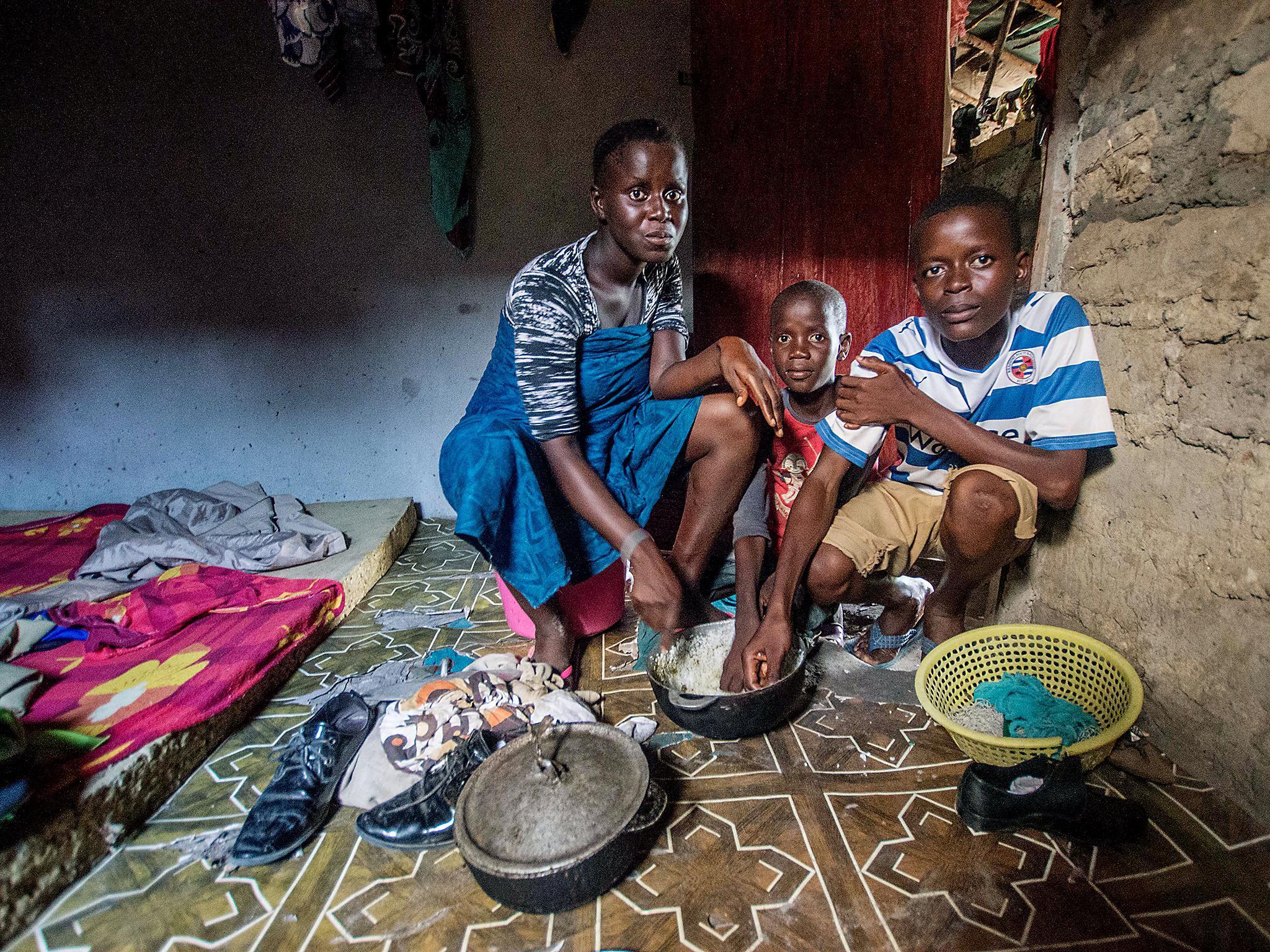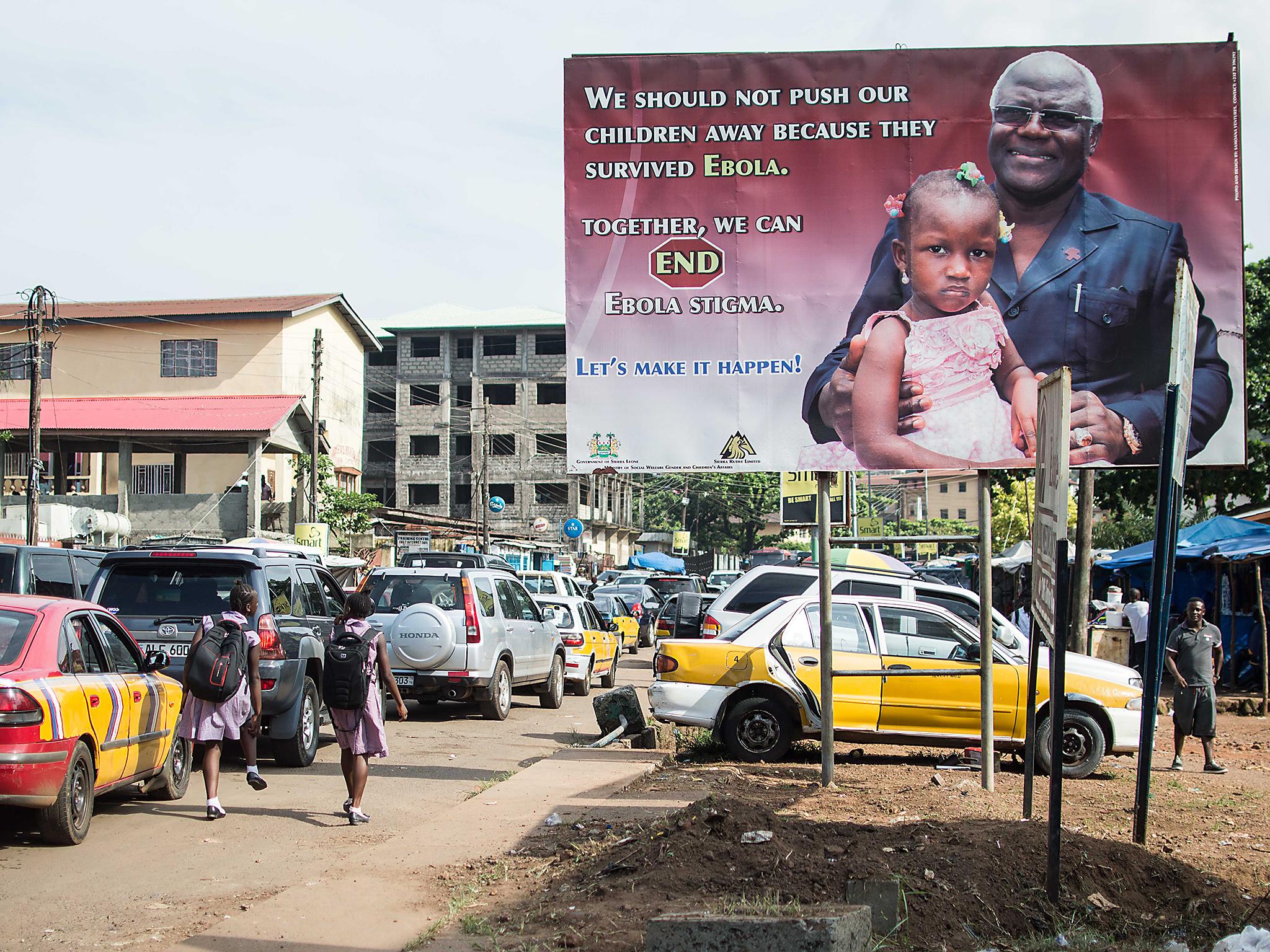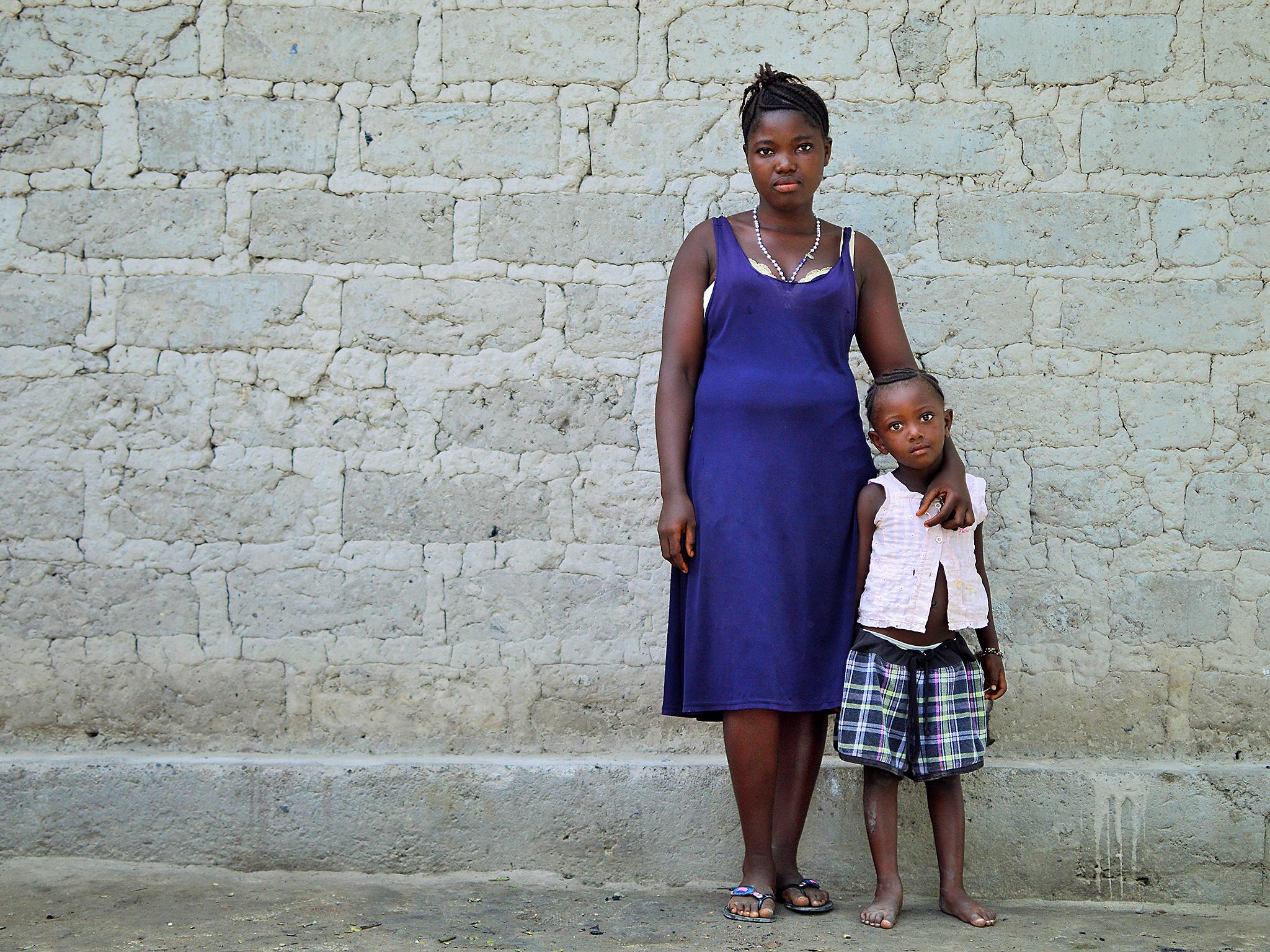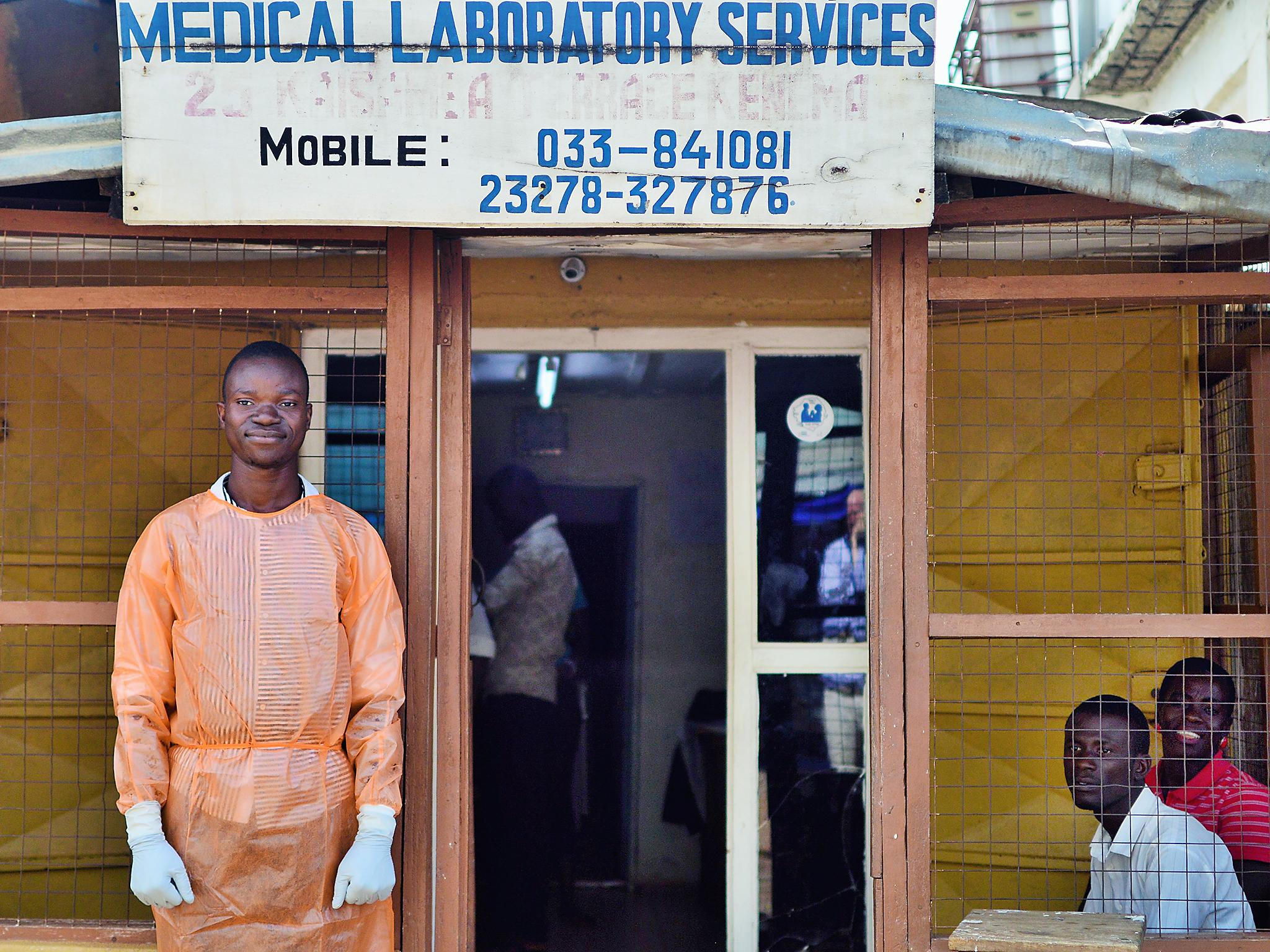Ebola's legacy: the heroism and fortitude of the children fending for themselves
Sierra Leone will mark the first anniversary of being Ebola free tomorrow. But the demise of the disease was just one victory, now the country is having to cope with the aftermath

Your support helps us to tell the story
From reproductive rights to climate change to Big Tech, The Independent is on the ground when the story is developing. Whether it's investigating the financials of Elon Musk's pro-Trump PAC or producing our latest documentary, 'The A Word', which shines a light on the American women fighting for reproductive rights, we know how important it is to parse out the facts from the messaging.
At such a critical moment in US history, we need reporters on the ground. Your donation allows us to keep sending journalists to speak to both sides of the story.
The Independent is trusted by Americans across the entire political spectrum. And unlike many other quality news outlets, we choose not to lock Americans out of our reporting and analysis with paywalls. We believe quality journalism should be available to everyone, paid for by those who can afford it.
Your support makes all the difference.Mariatu is only 16 but she looks older, she has two playful younger brothers aged 12 and nine. The boys are trying to eat the cassava leaf that is waiting in a pot on the floor in the kitchen for dinner. Mariatu scolds them teasingly and they all giggle. Her tiny house is in the backstreets of Freetown, the capital of Sierra Leone. It is cluttered and dirty. Last year, at the age of 15, Mariatu became the head of the household. She had no choice: she lost both her parents to the deadly Ebola crisis that ended almost exactly one year ago.
Tomorrow at 11am, Sierra Leone will stand still for three minutes to remember the 4,000 people who lost their lives to the Ebola virus. Flags will be lowered to half mast and traffic will stop. The radio will fall silent. Mariatu is one of over 12,000 Ebola orphans that Street Child, a British NGO, estimates were orphaned when Ebola swept Sierra Leone in 2014-15. She is one of many child-headed households who are still desperately struggling to get by. In one year, her life has been turned upside down. She says: “My mother attended a funeral service of a neighbour who died [of Ebola], when she came back she said that she felt feverish. My father accompanied her to the hospital. She died and my father came back to the house. A week later he started to vomit.”
He advised us not to go near him and he stayed in my mother’s room, we went to stay with a friend of theirs. My brother passed by the window of my father’s room and saw him dead inside. A burial team came to take him away. Until this day we don’t know where he and my mother are buried. As she says these last words, Mariatu starts to cry. “After my father died we were driven from the house as the owner was afraid of us and didn’t want us to pass on the disease. Now we are back at my father’s house where we all live. I do petty trading to try and support both my brothers through school but it is very hard to raise the money for fees, books and uniforms. I also do all the cooking in the house. We receive support from no one, not even the community. We have aunts and uncles but they don’t care and they don’t help us.”
“I want to be somebody, I want to finish school and become a soldier. I also really want my brothers to finish education and get well paid jobs. I get on very well with both my brothers, we look after each other”. After being noticed by a social worker from Street Child, Mariatu and her brothers will now receive support, but their plight is characteristic of the problems faced by the most vulnerable groups of Ebola-hit children, and there are many more like them for whom life has got worse since Ebola. Street Child CEO Tom Dannatt says: “We have met with many teenage orphans like Mariatu who have taken on the burden of looking after their young siblings and are struggling to cope. Several have dropped out of school, sacrificing their own futures to try and make sure that their brothers and sisters can stay in education. Sadly, running a business and a household is proving too tough for many of them.”

Driving through Freetown today, peeling billboards stating “do not reject the Ebola orphan” and dog-eared posters telling you how to avoid Ebola are a visual reminder of the deadly epidemic that swept the land. On 7 November 2015 the small West African country of Sierra Leone celebrated an emotional liberation from the Ebola virus that had ravaged communities and decimated families. The President announced that the country was officially Ebola free and the world joined the jubilation, sharing the “bye bye Ebola” dance video as the crisis was declared over.
Today, the overcrowded Ebola treatment centres that filled our news channels with scenes of tragedy and horror at the height of the epidemic are eerily silent ghost towns. The checkpoints manned by armed guards who took your temperature and asked you to wash your hands are no more. Tomorrow’s anniversary will be a day of mixed emotions. It will be a celebration that the feared re-emergence of the disease has not happened. It will also recognise that there is barely a person in the country who didn’t lose someone during the crisis and that many are still feeling the emotional, physical and economic impact today.
Whilst there has been some welcome recovery for many Ebola impacted families and thousands of orphans have been helped – Street Child has supported 8,000 Ebola impacted families with business grants in the last 18 months – some of the most at-risk orphans are still in acute conditions. The United Nations Popular Fund states that 18,119 teenage girls became pregnant during Ebola. Many of these girls were orphans like Kadiatu who exchanged sex for food to feed themselves and their younger siblings after losing their parents.
A new generation of babies born to teenage mums during Ebola now have a bleak future ahead of them if no one steps in to help. Street Child has identified 1,400 seriously at-risk orphans like Kadiatu and Mariatu who need substantial support. Many are in child or grandparent headed households, or are teenage mums. The charity wants to help them but urgently needs more resource to do so. For these children, the crisis is far from over. In fact in many ways it is at its most dangerous – international support and interest has largely moved on, and the economy has crashed.
The double kick of Ebola combined with a drop in the country’s main commodity, iron ore, has caused a devastating economic crisis that is making life even harder for those desperately trying to get back on track. In the last few months, food prices have rocketed and wages have stagnated. A bag of rice, the staple food stuff, has more than doubled in price since 2014. Last week UN food agencies and the Sierra Leone government published a report stating that half of the population now face food shortages. Recently, the government has been forced to implement formal austerity measures – a grim thought in one of the world’s very poorest countries. For many Sierra Leoneans, the hard times are about to get harder.

A few hours drive south of Freetown, in Kenema, 24-year-old Douda stands in his late father’s medical clinic testing blood samples for diseases like Malaria. He is dressed in full medical protection clothing, complete with two sets of gloves and a splash guard for his face. He has taken on the same job as his father. The job that two years ago led his father to contract the Ebola virus that killed him and most of the family. It is no wonder that today Douda is extremely cautious to observe strict hygiene practices in his clinic. Thinking back to the time of Ebola, he says: “I had been looking after my father before he was admitted to the treatment centre, then I started to feel ill and I knew what it was. I walked the mile and half to the centre to get tested. It was the British nurse, Will Pooley, who told me: ‘Douda – you are positive for Ebola.’ I tried to help when I was being treated in the centre, to make jokes, keep people’s spirits up but it was tough – you would be talking to someone and the next minute they had gone crazy with the disease and passed.”

Only Douda and his little brother Richard made it out of the treatment centre alive. He says: “I was happy to survive but it was also very hard. We had lost our family: my father, stepmother, grandmother, brother and sister. People did not want to speak to us, to help us. The only people who helped us were Street Child, they gave us psycho-social support, they consoled my heart and they stopped us from losing our house.”
There is an extraordinary resilience in Douda, who is running his father’s business in spite of the daily reminder of what happened, and in spite of the stigma that he is still subjected to as a survivor of the disease. It is a resilience that is mirrored across Sierra Leone. Yet this resilience can only do so much. He says that his business is suffering because people are scared of the clinic: “Life is hard because people are fearful of the laboratory since Ebola, the stigma here still exists. We need to overcome that, then business will get better.”
Six months ago, Douda’s main challenge was the stigma of Ebola, now, Sierra Leone’s economic collapse means that people simply cannot afford to use his services. Almost miraculously, Douda is still managing to make his business work but he is not turning a large enough profit to provide properly for his little brother Richard, so he has had to send the only remaining member of his family to live with a relative in another district. One year on from the end of Ebola, Sierra Leone is facing a new crisis. Street Child social worker George Quaker sums this up well, saying: “Life, light and hope has returned to many communities one year after Ebola, largely due to the help of the international community and NGOs, but the economic downturn has given us a kick in the stomach. The nation is groaning in economic pain. This is the new crisis we face and it is worst for children and families hit hardest by Ebola.”
To learn more about, or support, Street Child’s work with children and families still devastated by the impact of Ebola, visit street-child.co.uk. Molly Hodson is Global Communications Director for Street Child
Join our commenting forum
Join thought-provoking conversations, follow other Independent readers and see their replies
Comments